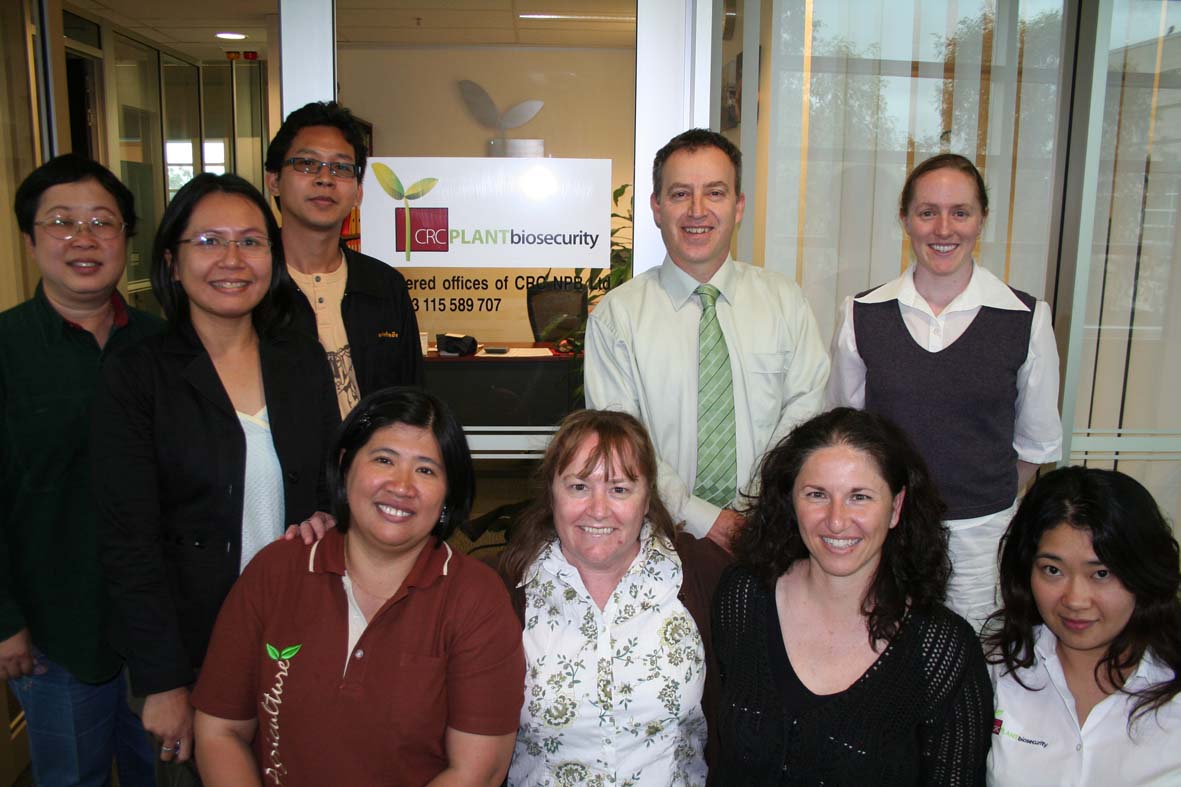
© 2009-2012 CRC for National Plant Biosecurity | Disclaimer
![]()


 Due to the increased movement of people and agricultural produce across the globe, international collaboration has become more important than ever to help protect our borders against incursions of exotic pests and diseases and maintain pest-free status within borders to ensure market access for export produce.
Due to the increased movement of people and agricultural produce across the globe, international collaboration has become more important than ever to help protect our borders against incursions of exotic pests and diseases and maintain pest-free status within borders to ensure market access for export produce.
Following on from the April edition of The Leaflet [1]when Gary Kong and his project team visited Bangkok, it was now our turn to host. Four CRC scientists from Thailand completed their second residential period in Australia, staying from October to early December.
Dr Nuttima Kositcharoenkul, Mr Alongkot Phodee, Ms Preyapan Pongsapich and Ms Sukhontips Sombat are now half way through a series of six of these training workshops, three in Australia and three in Bangkok. Over three years, this intensive program will provide them with specialised training in molecular diagnostics.
Nuttima and Alongkot have been training in Dr Deb Hailstones’ laboratory at Industry & Investment NSW and working with Ms Michelle Flack, Ms Anna Englezou and Ms Ania Deutscher. Preyapan and Sukhontips spent their time training in Dr Brendan Rodoni’s laboratory at Department for Primary Industries, Victoria, under the care of Miss Linda Zheng and Mr Chris Bottcher.
As part of their 2009 program, the four trainees met up in Canberra in the week of 23 November, accompanied by some of their Australian laboratory colleagues. The group dropped in the CRC office to meet the staff, which was a great opportunity to put faces to names! Research Leader, Dr David Eagling met with the trainees to discuss their areas of work, both in Bangkok and in their current training, and potential collaborative research areas for the future.
During their stay in the nation’s capital the group also visited CSIRO Entomology to meet up with the remote microscopy team. To add further value to their visit, they made some new contacts at the Australian National Insect Collection and Australian National University. Before the group departed there was just enough time to visit some of Canberra's tourist attractions, including the Botanic Gardens, the Thai consulate, Mrs Sawanit Phongprapai and Parliament House.
Each member of the group is specialising in a particular area. Nuttima’s training in Australia has concentrated on molecular diagnosis of phytopathogenic bacteria, particularly the Xanthomonads and Alongkot has been focusing on molecular analysis of fruit flies. Preyapan and Sukhontips are specialising in viruses and viroids, particularly in potatoes. The Thai team have now headed home, with another workshop scheduled for Bangkok in the first half of 2010, they will then return to Australia later in the year.
This intensive training program is one of the themes within the CRC project ‘Increasing the diagnostic capacity in Thailand’ [2], led by Dr Gary Kong of Queensland Primary Industries and Fisheries and co-funded by Australian Centre for International Agricultural Research (ACIAR). Other themes include remote microscopy, advanced taxonomic training and surveillance.
Photo caption: The group visited the CRC office, from left Ms Preyapan Pongsapich, Ms Sukhontips Sombat, Mr Alongkot Phodee, Dr Nuttima Kositcharoenkul, Dr Deb Hailstones, Dr David Eagling, Ms Michelle Flack, Ms Anna Englezou and Miss Linda Zheng
Article written by: Dr Deb Hailstones, Program Leader, Diagnostics Research Program
Links:
[1] http://www.crcplantbiosecurity.com.au/content/Thailand-training
[2] http://www.crcplantbiosecurity.com.au/program/diagnostics/project/crc20093-increasing-diagnostic-capacity-thailand